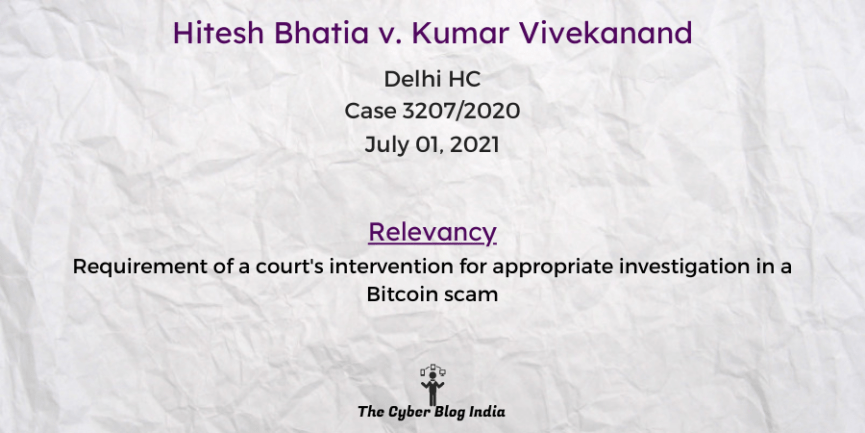Hitesh Bhatia v. Kumar Vivekanand

Hitesh Bhatia v. Kumar Vivekanand
In the High Court of Delhi
Case 3207/2020
Before Justice Abhinav Pandey
Decided on July 1, 2021
Relevancy of the case: Requirement of a court’s intervention for appropriate investigation in a Bitcoin scam
Statutes and Provisions Involved
- The Information Technology Act, 2000 (Section 66C, 67)
- The Indian Penal Code, 1860 (Section 403, 411, 420)
- The Code of Criminal Procedure (Section 156(3), 179, 180, 182, 200)
Relevant Facts of the Case
- The accused used to purchase Bitcoins from the complainant. He made the payment to the complainant’s bank account. In turn, the complainant transferred Bitcoins to the accused’s wallet with Binance.
- On July 05, 2020, the complainant received information about the freezing of his bank accounts. The concerned agency had declared his Bitcoin transactions illegal.
- Thereafter the complainant questioned the accused on the legality of money paid for Bitcoin. The accused admitted it was a scam.
- The complainant alleges cheating by the accused and has sought the Court’s intervention for directions to the police to register a criminal case and initiate an appropriate investigation.
- The complainant has submitted that he has approached the SHO and DCP, but the police has not taken any action.
Prominent Arguments by the Advocates
- The complainant’s counsel argued that presently, dealing in cryptocurrency is legal, and hence, the complainant was carrying out a legal trade and profession under Article 19(1)(g).
- The counsel also relied on the case of Internet and Mobile Association v. Union of India (2020) which sets aside the RBI guidelines advising not to deal in virtual currencies.
- The counsel further submitted that there is no fault of the complainant. He has a legitimate expectation of enjoying the fruits of a legitimate profession.
Opinion of the Bench
- After the Supreme Court set aside RBI guidelines, RBI issued a circular specifying due diligence requirements for customers in virtual currency transactions. RBI-regulated entities have to fulfil KYC, AML, and CFT requirements. The court also touched on the compliance requirements under the Prevention of Money Laundering Act, 2002, and the Foreign Exchange Management Act, 1999.
- The Supreme Court did not adjudicate the legality of virtual currency. However, the court noted the increasing acceptance of virtual currency.
- While the complainant asked for an Aadhaar card on WhatsApp, it is not his duty. It is the duty of intermediaries like Binance to comply with the requirements of general laws in force.
- Furthermore, the complainant has submitted screenshots that show that the accused was aware of the source of the money. The accused is also named as accused in two FIRs in cyber crime cases in Nagpur and Telangana.
- The chance of the complainant’s consent in the activities cannot be ruled out as the complainant accepted money into different accounts, which may not have been a mere lack of caution. In a WhatsApp conversation, the accused advised the complainant to clear his bank accounts on receipt of any consideration against bitcoins, and the complainant was not alarmed.
- Also, the complainant has not stated how the accused contacted him, so there exists a possibility of prior dealings between the parties. However, the complainant approached this Court knowing all the legal consequences, and this is a ground for giving directions for the investigation to find out the offender.
Final Decision
- The bench directed the Moti Nagar PS to lodge an FIR and send a compliance report to the Court in 2 days.
Julia Anna Joseph, an undergraduate student at Christ (Deemed to be University), prepared this case summary during her internship with The Cyber Blog India in January/February 2022.
